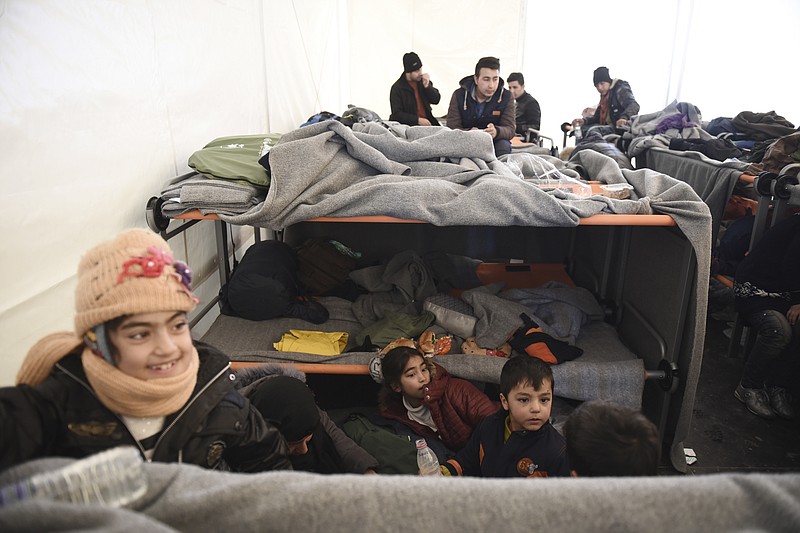AMSTERDAM (AP) - The Latest on the movement of refugees from the Middle East and elsewhere to Europe (all times local):
12:10 p.m.
Turkey kept its border with Syria closed for a second day but has let in more than a dozen Syrians who were injured in bombings around Syria's largest city of Aleppo.
Thousands of Syrians rushed toward the Turkish border Friday, fleeing fierce government offensives and intense Russian airstrikes.
Turkey has promised humanitarian help for the displaced civilians, including food and shelter, but it did not say whether it would let them cross into the country. Turkey is already burdened with some 2.5 million refugees from Syria.
The border crossing of Bab al-Salam - main crossing point for refugees and humanitarian aid - remained closed Saturday.
Turkish aid officials said Syrians who has massed at the border were being directed toward a displaced peoples' camp near the border crossing.
Turkey's state-run Anadolu Agency said 15 Syrians injured in bombings near Aleppo crossed into Turkey through the border gate late on Friday.
___
11:45 a.m.
German Chancellor Angela Merkel says giving refuge to Iraqis and Syrians is part of her country's effort to counter the Islamic State group.
Merkel says Germany "considers its support for Iraq against the so-called IS not just as military but also as humanitarian, such as by taking in refugees."
Merkel has faced growing criticism in her country for allowing an unprecedented number of asylum seekers - almost 1.1 million last year - to enter Germany.
In her weekly video podcast Saturday, she urged refugees from Iraq and Syria to integrate in the country and learn German. But she also says refugees are being taught transferable skills that will help them rebuild their home countries when peace returns.
Merkel backed calls for better protection of the European Union's external borders.
___
11:40 a.m.
Turkish media say police have raided three factories producing unlicensed and poor-quality inflatable boats used to smuggle migrants to Greece.
The state-run Anadolu Agency said Saturday police seized 49 boats in the simultaneous raids in the Aegean coastal city of Izmir a day earlier.
The agency says the factories' owners were fined for unlicensed production of the boats. According to the private Dogan news agency, they faced administrative action that could lead to the closing the factories.
Police in Istanbul and elsewhere have in the past months conducted similar raids on workshops that produce defective lifejackets sold to migrants.
Turkey is under intense pressure to stem the flow of migrants to Europe. In November, it agreed to fight the smuggling networks and help curb irregular migration. In return, the European Union pledged 3 billion euros ($3.25 billion) to help improve the refugees' conditions.
The International Organization for Migration says 284 migrants have died so far this year trying to make the dangerous crossing from Turkey to Greece.
___
10 a.m.
European Union foreign ministers anxious to stem the flow of migrants coming through the Balkans are discussing with their counterparts from the region better ways to protect borders.
With Greece unable to control the thousands of migrants making the crossing from Turkey, some EU nations are now looking to help non-member Macedonia stop them at its southern border before they get to the European Schengen zone of border-free travel.
Hungarian Foreign Affairs Minister Peter Szijjarto says, "If Greece is not ready or able to protect the Schengen zone and doesn't accept any assistance from the EU then we need another defense line which is obviously Macedonia and Bulgaria."
